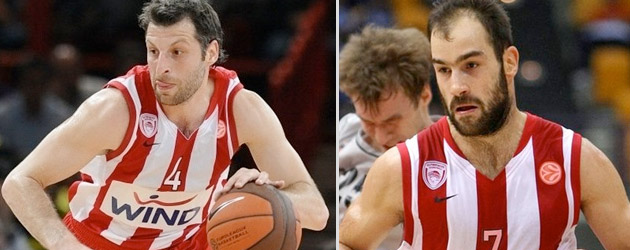By: Rafael Euehara / @rafael__uehara
Olympiacos Piraeus had a phenomenal season last year. Not everybody has a shot at a Triple Crown, but the Greek powerhouse won the 2010 Greek Cup, and reached the championships of both the Greek A1 League and the Euroleague but fell to arch-rival Panathinaikos and Regal FC Barcelona, respectively.
Last summer, Greece was hurting with the impact of the worst financial crisis of its history. A crisis so strong that, by itself, made people question the strength of the Euro zone and almost destroyed the €uro. Those financial woes were generated by years of unrestrained spending, cheap lending, failure to implement financial reforms and lack of structure on Greece’s public sector.
Olympiacos was projected to be affected by the unstable economic landscape and did lose the team’s two best players; Linas Kleiza to the Toronto Raptors and Josh Childress to the Phoenix Suns. The iconic Sofoklis Schortsanitis left too, for a Summer League stint with the Los Angeles Clippers and then returning to Europe, settling in Israel. Getting a legit shot at a Triple Crown but losing two of the three titles was somehow considered a failure and Head Coach Panagiotis Giannakis was forced out.
Contradicting all sorts of forecasts, Piraeus surprisingly reloaded in the offseason. The high-profile additions of the legendary Dusan Ivkovic, the hyper-productive Vassilis Spanoulis, the underrated Matt Nielsen, the affective Rasho Nesterovic and the budding talent Marko Keselj reinforced the team’s status as title contenders.
Last season’s formula relied on basically overwhelming opponents with the amount of high-volume scoring they had in the perimeter. Their backcourt and wings were responsible for the scoring load. Kleiza was the primary option (a league-leading 17.1 PPG in Euroleague play last season), Childress was the secondary (15.2 PPG) and somewhere in between they ran a pick-and-roll or pick-and-pop sets that featured their guards (Milos Teodosic, Theo Papaloukas or Patrick Beverley) as the main playmakers and either Ioannis Bourousis or Sofo setting the heavy-weight screens.
It worked. Kleiza won the Alphonso Ford trophy, Teodosic was named the league’s Most Valuable Player and they did reach the championship game of the Euroleague. But on that game, Olympiacos’ offense stalled out. They struggled with Fran Vazquez’s length protecting the rim…
…and Boniface N’Dong’s solid pick and roll recovery…
…and Barca’s discipline in general, though they were lucky enough to bail themselves out with prayers late in the shot clock…
and it took a supreme athlete like Josh Childress to beat Barca’s help D by even half a step…
When Ivkovic took over, he proposed change. The Serbian had sent signals before competitive play begun that he would change the way the Euroleague runners-up play, introducing a more modern style of basketball featuring a lot of ball movement and producing 25% of their points from fast-breaks and 60% from secondary ones.
That change is visible. According to ELA’s friends at in-the-game.org, Olympiacos leads the Euroleague in pace. They push the ball a lot more and run a lot more. In the half-court, equipped with a more mobile big Nesterovic (well, at least more mobile than Sofo), the vast majority of their sets are high screen-and-rolls, whether it leads to shot attempts at the rim…
…or wide-open three-point shot attempts at the wing…
…or at the corner…
When the season started, we all had the impression that Barcelona was going to run over the entire league on their way to an undisputed repeat, but thanks to injuries to Juan Carlos Navarro and Pete Mickeal, they didn’t look so good at the initial group stages. But now they’re back to being dominant, Ricky Rubio is playing better, and they seem to be peaking on their way to the playoffs. It looks that to win the 2011 Euroleague title, you’ll need to pass through Regal at some point.
Can Olympiacos’ offense guide them to glory? Have they advanced enough to put up a more decent fight against Barça? Those are questions that remain to be answered. Looking at the landscape of the Euroleague, one hopes we’ll reach that climax and get a chance to have those questions answered.
Rafael Uehara is a scout for NetScouts Basketball and the managing figure of ‘The Basketball Post’, his personal website. He’s a contributor for ELA and can be followed on twitter @rafael__uehara or reached via e-mail at [email protected]
 Posts
Posts
